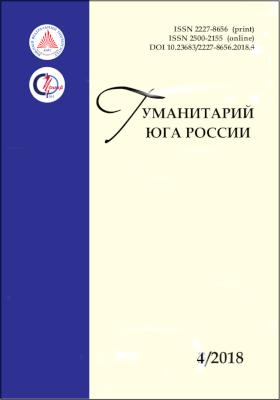Информация: социально-философская концептуализация понятия
Для цитирования
Кушнир Д. Ю. Информация: социально-философская концептуализация понятия // Гуманитарий Юга России. 2018. Том 7. № 4. С. 141-148. DOI: https://doi.org/10.23683/2227-8656.2018.4.11
Аннотация
В статье анализируются различные подходы к рассмотрению понятия «информация». Принято характеризовать информацию как основное условие экономического развития наравне с капиталом, трудом и сырьем, но что делает информацию особенно значимой в современном мире, так это ее цифровая природа. Стоит также отметить, что влияние информационных технологий на естественные и социальные науки сделало это понятие весьма противоречивым. «Математическая теория связи» К. Шеннона (1948 г.) является знаковой работой. В ней говорится об общем использовании информации с ее семантическими и прагматическими измерениями. Тот факт, что понятие «обмен знаниями» обозначается словом «информация», представляется особым лингвистическим явлением.Актуальность статьи состоит в том, что данное понятие играет центральную роль в современном обществе. Хотя знания и их взаимосвязь являются основными явлениями любого человеческого общества, именно развитие информационных технологий и его глобальные последствия характеризуют наше общество как информационное.
Ключевые слова:
информация, концепции информации, интерпретация, контекст, сообщение, обратная связь, смысл, атрибутивная концепция, функциональная концепция, антропоцентрическая концепция
Литература
Бакленд М.К. Информация как вещь // Журнал Американского общества информационной науки. 1991. № 42. С. 351–360.
Вайцзеккер С.Ф. Время и знание. Майзенхайм, 1992.
Винер Н. Кибернетика, или Управление и связь в животном и машине. М. : Советское радио, 1968.
Израэль Д., Перри Дж. Информация и архитектура // Теория ситуаций и ее приложения / под ред. Дж. Барвиза, М.Дж. Гаврона, Дж. Плоткина, С. Тутя. Стэнфорд, 1991. С. 147–160.
Капурро Р. Герменевтика научной информации. 1986. Режим доступа: http:// www.capurro.de/hermeneu.html.
Карпачев Б. Человеческая деятельность. Вклад в антропологические науки с точки зрения теории деятельности. Копенгаген, 2000.
Корвак К., Якоби К. Информация. Новые вопросы к междисциплинарной концепции. Берлин, 1996.
Махлуп Ф., Мэнсфилд Э. Информация. Новые вопросы мультидисциплинарной концепции. Нью-Йорк, 1983.
Оезер И. Наука и информация. Вена, 1976.
Ореховская Н.А. К вопросу определения понятия «социальная коммуникация» // Социально-гуманитарные знания. 2016. № 2. С. 104–109.
Ригер Б.Б. Ситуационная семантика и компьютерная лингвистика: к информационной экологии. Семиотическая перспектива для когнитивных систем обработки информации? // Информация. Новые вопросы к мультидисциплинарной концепции / под ред. К. Корвака, К. Якоби. Берлин, 1996. С. 285–315.
Титце Х. Является ли информация принципом? Майзенхайм, 1971.
Хайдеггер М. Путь к языку. Пфуллинген, 1959. C. 239–268.
Хайдеггер М., Финк И. Гераклит. Франкфурт-на-Майне, 1970.
Шеннон К. Математическая теория коммуникации // Bell System Technical Journal. 1948. № 27. С. 379–423.
Шеннон К., Уивер В. Математическая теория коммуникации. Урбана, 1949.
Вайцзеккер С.Ф. Время и знание. Майзенхайм, 1992.
Винер Н. Кибернетика, или Управление и связь в животном и машине. М. : Советское радио, 1968.
Израэль Д., Перри Дж. Информация и архитектура // Теория ситуаций и ее приложения / под ред. Дж. Барвиза, М.Дж. Гаврона, Дж. Плоткина, С. Тутя. Стэнфорд, 1991. С. 147–160.
Капурро Р. Герменевтика научной информации. 1986. Режим доступа: http:// www.capurro.de/hermeneu.html.
Карпачев Б. Человеческая деятельность. Вклад в антропологические науки с точки зрения теории деятельности. Копенгаген, 2000.
Корвак К., Якоби К. Информация. Новые вопросы к междисциплинарной концепции. Берлин, 1996.
Махлуп Ф., Мэнсфилд Э. Информация. Новые вопросы мультидисциплинарной концепции. Нью-Йорк, 1983.
Оезер И. Наука и информация. Вена, 1976.
Ореховская Н.А. К вопросу определения понятия «социальная коммуникация» // Социально-гуманитарные знания. 2016. № 2. С. 104–109.
Ригер Б.Б. Ситуационная семантика и компьютерная лингвистика: к информационной экологии. Семиотическая перспектива для когнитивных систем обработки информации? // Информация. Новые вопросы к мультидисциплинарной концепции / под ред. К. Корвака, К. Якоби. Берлин, 1996. С. 285–315.
Титце Х. Является ли информация принципом? Майзенхайм, 1971.
Хайдеггер М. Путь к языку. Пфуллинген, 1959. C. 239–268.
Хайдеггер М., Финк И. Гераклит. Франкфурт-на-Майне, 1970.
Шеннон К. Математическая теория коммуникации // Bell System Technical Journal. 1948. № 27. С. 379–423.
Шеннон К., Уивер В. Математическая теория коммуникации. Урбана, 1949.
Форматы цитирования
Другие форматы цитирования:
APA
Кушнир, Д. Ю. (2018). Информация: социально-философская концептуализация понятия. Гуманитарий Юга России, 7(4), 141-148. https://doi.org/10.23683/2227-8656.2018.4.11
Раздел
ФИЛОСОФИЯ И ОБЩЕСТВО






